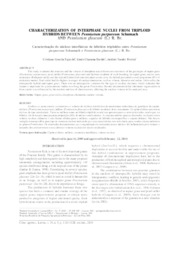Characterization of interphase nuclei from triploid hybrids between Pennisetum purpureum Schumach and Pennisetum glaucum (L.) R. Br.
Characterization of interphase nuclei from triploid hybrids between Pennisetum purpureum Schumach and Pennisetum glaucum (L.) R. Br.
Author(s): FAJARDO, C. G.; DAVIDE, L. C.; PEREIRA, A. V.
Summary: This study evaluated the structure and the volume of interphase nuclei from root meristems of the genotypes of napier grass (Pennisetum purpureum), pearl millet (Pennisetum glaucum) and hybrids resultant of such breeding. In napier grass, nuclei were areticulate. Both pearl millet and the triploid hybrid had semi-reticulate nuclei; also, the hybrid presented a small proportion (6%) of areticulate nuclei. Pearl millet had the highest averages of nuclear dimensions, such as volume, diameter and radius, followed by the interspecific hybrid and napier grass. There was no intraspecific variation for the type of nuclear structure, which indicates this feature is important for cytotaxonomic studies involving the genus Pennisetum. Results demonstrated that chromatin organization in these nuclei was influenced by the number and size of chromosomes, affecting the nucleus volume in the analyzed taxa.
Publication year: 2010
Types of publication: Journal article
Unit: Embrapa Dairy Cattle
Keywords: Interphase chromatin, Napier grass, Nuclear volume, Pearl millet
Observation
Some of Embrapa's publications are published as ePub files. To read them, use or download one of the following free software options to your computer or mobile device. Android: Google Play Books; IOS: iBooks; Windows and Linux: Calibre.
Access other publications
Access the Agricultural Research Database (BDPA) to consult Embrapa's full library collection and records.
Visit Embrapa Bookstore to purchase books and other publications sold by Embrapa.

